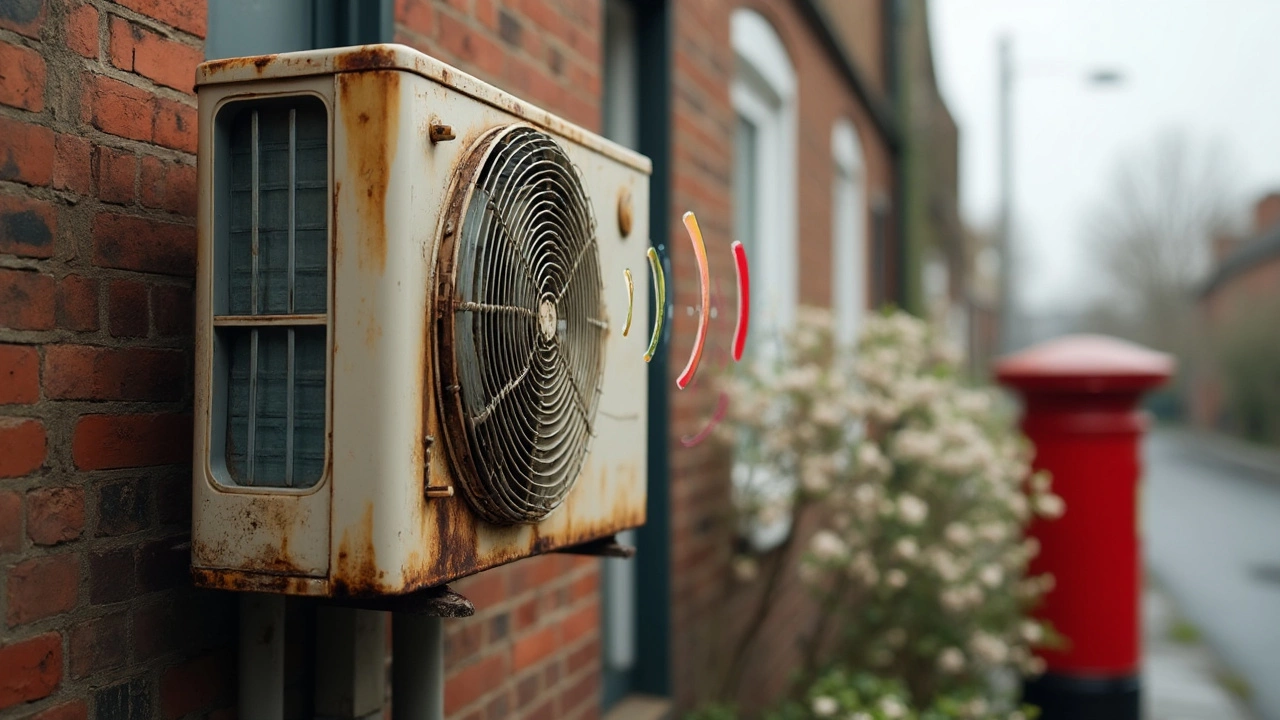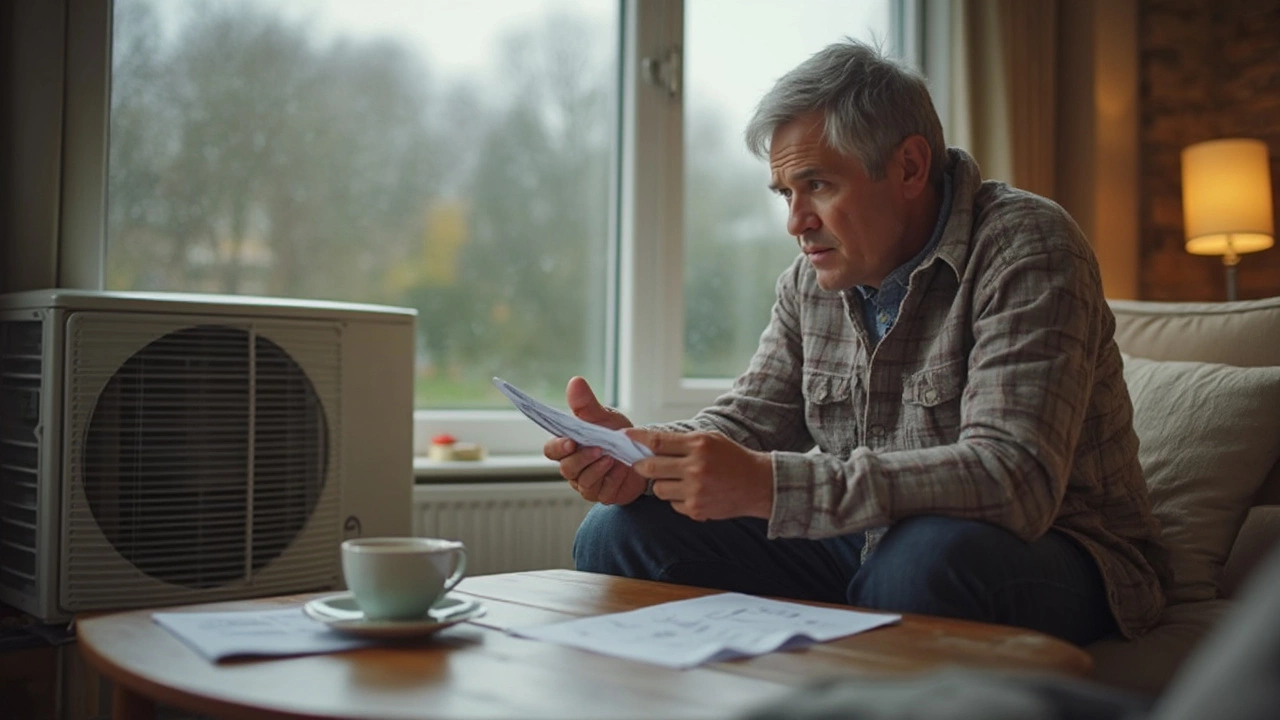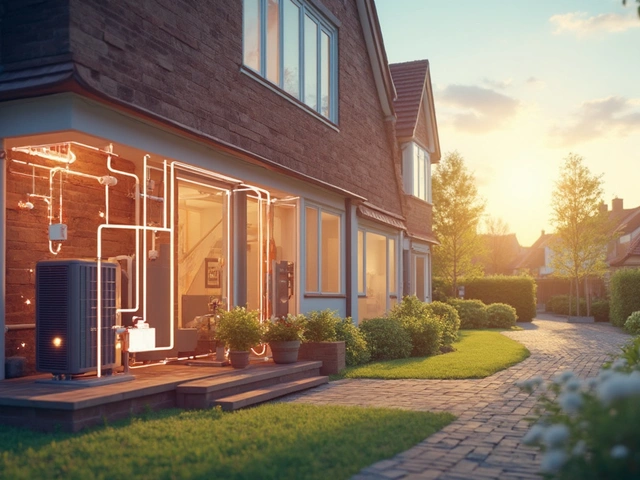If your heat pump has started acting up, you might be wondering if it’s time to swap it for a new one or just call in another repair. You’re not alone—deciding when to replace versus repair can be tricky, but there are some dead giveaways.
The first thing most folks notice is their power bill creeping up, sometimes suddenly. If your bill jumps but you haven’t changed how you use heating or cooling, your pump could be losing its mojo. A system that’s working way too hard to keep your place comfortable is waving a big red flag.
Another classic sign? Strange noises. A smooth-running heat pump shouldn’t sound like a rock tumbler or a car with a busted muffler. If you hear grinding, rattling, or loud humming, something deep inside may be wearing out for good.
It’s tempting to keep patching up the old unit, especially if you like saving cash. But if you’re calling for service every few months, or your handyman knows your unit’s quirks better than you do, it might be time to cut your losses. Repairs add up, and at some point, they don’t make sense compared to a new system.
- Age and Lifespan Myths
- Noisy or Unusual Operation
- Skyrocketing Energy Bills
- Constant Repairs and Downtime
- When Repair Isn't Worth It
Age and Lifespan Myths
People love to talk about how heat pumps "should" last forever, or at least until you remodel the house. That’s just not true. Most heat pumps grind out about 10 to 15 good years. After that, not only do they start losing efficiency, but repairs pop up more and more often. The old "well-maintained units will last for decades" myth gets tossed around, but regular tune-ups can only do so much once the core components start to wear out.
If you’ve got a system that’s limping past 12 years, you’re probably spending more on energy and repairs than you realize. The U.S. Department of Energy says,
"Replacing a heat pump unit that's more than 10 years old can save you 20% to 40% on your energy costs."That’s cash back in your pocket instead of burning away on an old machine.
You might think, "But my neighbor’s heat pump is going strong at 18 years!" That might be true—for now. Environment, brand, and how much you run it all make a big difference. A heat pump in Florida working year-round will wear out faster than one in a mild climate. Here are some quick facts to keep it real:
| Average Lifespan (years) | Common Problems After |
|---|---|
| 10 | Reduced efficiency, noisy operation |
| 12 | Higher repair frequency, uneven temperature |
| 15+ | Major part failures, costly repairs |
So if your heat pump is hitting double digits in age, it’s smart to start thinking about replacement. Waiting until it completely dies usually means dealing with a breakdown at the worst time—like on a freezing January morning.
Noisy or Unusual Operation
If your heat pump is suddenly making a racket, that’s not normal. These systems should hum along so quietly you barely notice them. When you start hearing clanking, rattling, grinding, or even screeching, your heat pump is trying to get your attention. These noises usually point to worn-out parts, loose hardware, or even something stuck in the unit.
Each strange sound can mean something different. Here’s a quick breakdown:
- Rattling: Loose screws, fan blades, or panels.
- Grinding: Motor bearings are shot. A big red flag.
- Screeching or squealing: Bad fan belt or motor issues. Needs fast attention.
- Banging or clanging: Parts are loose or have broken off and are knocking around inside the unit.
- Clicking: Relay or electrical problems, especially if it won’t start.
If noises show up all of a sudden, especially after a repair job, there could be a bigger problem. According to HVAC industry numbers, about 70% of heat pumps over ten years old show signs of mechanical noise before total breakdown.
| Noise | Likely Cause | Urgency |
|---|---|---|
| Rattling | Loose parts or debris | Schedule checkup soon |
| Grinding | Motor damage | Call tech ASAP |
| Screeching | Bad belt or motor | High |
| Banging | Broken component | Stop use, call tech |
| Clicking | Electrical or relay issue | Medium |
If you ignore weird sounds, damage snowballs—sometimes fast. Catching things early keeps your heat pump from failing when you need it most. If you’re hearing more than a gentle hum, it’s way better to call an expert before you end up shopping for a new unit on short notice.

Skyrocketing Energy Bills
Notice your energy bills climbing for no good reason? This is one of the first things that makes folks stop and wonder if their old heat pump is pulling its weight. When your heat pump gets older or starts to fail, it loses efficiency—meaning it eats up more electricity just to do the same job. The result is a bigger number on your bill every month, sometimes by a lot.
According to the U.S. Department of Energy, even a heat pump that’s only 10 years old could be 20–30% less efficient than when it was brand new. That kind of drop adds up fast, especially in places where winter or summer lasts for months. Let’s look at just how much energy costs can change as your system ages:
| Age of Heat Pump | Average Efficiency Loss (%) | Possible Bill Increase (%) |
|---|---|---|
| 5 years | 5% | 5-8% |
| 10 years | 20% | 15-20% |
| 15+ years | 30%+ | 25% or more |
If you see that your power bill has jumped up compared to the same month last year, but you haven’t changed your thermostat settings or used your home differently, your heat pump could be the culprit. Here are some easy ways to tell if your heat pump is driving up your energy costs:
- Your monthly bill just keeps increasing with no weather changes.
- Neighbors with similar homes and newer pumps pay much less.
- You hear your unit running constantly, even when the weather isn’t that extreme.
If you tick off more than one of those boxes, that’s a solid hint you’re throwing money away. Replacing a dying system usually pays for itself in lower bills, especially if your model is older than a decade.
Constant Repairs and Downtime
If you’re on a first-name basis with your HVAC tech, your heat pump might be sending out a clear SOS. When breakdowns become the norm rather than the exception, it’s a good sign your unit is reaching the end of the road. You might notice you’re calling for fixes during every season—maybe it’s a dead thermostat in winter or funny-smelling air in summer. A heat pump should run without constant drama. If your calendar is filling up with repair appointments, that’s not normal.
Here’s the kicker—repair costs pile up fast. Experts say if your yearly repair total is more than half the price of a new system, you’re wasting money keeping the old one on life support. On average, a full heat pump replacement runs $5,000 to $8,000 in the U.S., but repair bills can top a thousand a year if things are going south. Check out how costs can add up over time:
| Year | Repair Costs | Total So Far |
|---|---|---|
| Year 1 | $450 | $450 |
| Year 2 | $680 | $1,130 |
| Year 3 | $925 | $2,055 |
| Year 4 | $1,100 | $3,155 |
This table shows how repair costs sneak up on you. Before you know it, you could have put that cash towards a shiny, more efficient heat pump instead.
Downtime is another headache. When your system croaks right in the middle of a heatwave or a deep freeze, you’re stuck with either sweating it out or freezing. More downtime also means more time off work to meet the repair crew—and that’s no one’s idea of fun.
The bottom line? When constant repairs take over your schedule, and your old heat pump is more trouble than it’s worth, you’re better off with a new unit. You’ll save money, headaches, and likely score lower energy bills to boot.

When Repair Isn't Worth It
Sometimes, putting more money into fixing your heat pump just doesn't make sense. If the repair is close to half the cost of a new unit, most pros say you're better off replacing it. For example, if a big breakdown costs you $2,500 and a solid new system runs about $5,000, that's a red flag.
A heat pump that’s more than 10-15 years old will almost always be a bad investment for repairs. Energy Star recommends considering replacement at the 10-year mark, especially if you notice performance issues. Newer models are up to 40% more efficient, which means lower bills and less hassle.
- Your warranty is expired and you’re footing the full repair bill every time.
- You have trouble finding replacement parts or your technician keeps saying “they don’t make ‘em like they used to.”
- The system breaks down every season, not just once in a blue moon.
Check out this table for a quick breakdown:
| Situation | Recommended Action |
|---|---|
| Unit is over 12 years old and breaks often | Replace |
| Major repair is more than 40% of new unit cost | Replace |
| Repairs are cheap and unit is under 10 years | Repair |
Don’t forget the hidden costs either—older heat pumps don’t just cost more to fix, they may also chew through electricity, driving those monthly bills higher. If you’re seeing the double whammy of expensive repairs and higher energy costs, that’s your cue.





